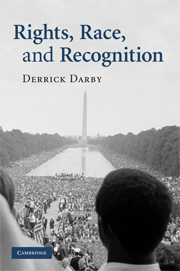3 - Rights and recognition
Published online by Cambridge University Press: 20 January 2010
Summary
I was in bondage in Missouri, too. I can't say that my treatment was bad. In one respect I say it was not bad, but in another I consider it was as bad as could be. I was a slave. That covers it all. I had not the rights of a man.
–Benjamin Miller, Slave TestimonyFor many people it is comforting to believe that we have natural rights, ones that come to us by the hand of our creator or by the hand of human nature. But I believe that there are no rights that exist prior to and independent of some form of formal or informal social recognition of ways of acting and being treated by a community of persons. Hence insofar as natural rights, human rights, and presocial moral rights are typically understood as having such prior and independent existence, I believe that there simply are no such rights. All rights—moral ones included—are a species of unnatural rights. So contrary to the prevailing view—the dominant versions of which I critically assessed in the previous chapter—whatever rights we do have (if any at all) are bestowed on us by a community of persons.
While possible shortcomings of this view come readily to hand, its virtues are more elusive for readers steadfastly devoted to the prevailing view. I proceed therefore by advancing a political justification for imposing a social constraint on what having moral rights amounts to.
- Type
- Chapter
- Information
- Rights, Race, and Recognition , pp. 74 - 108Publisher: Cambridge University PressPrint publication year: 2009



